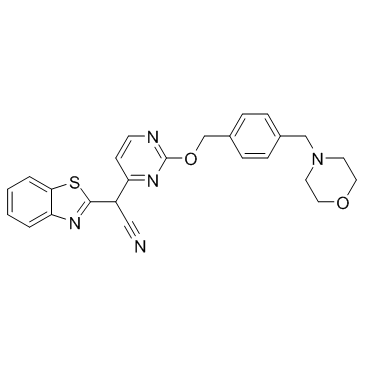Bentamapimod
Modify Date: 2024-02-04 15:47:04

Bentamapimod structure
|
Common Name | Bentamapimod | ||
|---|---|---|---|---|
| CAS Number | 848344-36-5 | Molecular Weight | 457.547 | |
| Density | 1.3±0.1 g/cm3 | Boiling Point | 666.5±65.0 °C at 760 mmHg | |
| Molecular Formula | C25H23N5O2S | Melting Point | N/A | |
| MSDS | N/A | Flash Point | 356.9±34.3 °C | |
Use of BentamapimodBentamapimod (AS 602801) is an ATP-competitive JNK inhibitor with IC50 of 80 nM, 90 nM, and 230 nM for JNK1, JNK2, and JNK3, respectively. |
| Name | 2-(1,3-benzothiazol-2-yl)-2-[2-[[4-(morpholin-4-ylmethyl)phenyl]methoxy]pyrimidin-4-yl]acetonitrile |
|---|---|
| Synonym | More Synonyms |
| Description | Bentamapimod (AS 602801) is an ATP-competitive JNK inhibitor with IC50 of 80 nM, 90 nM, and 230 nM for JNK1, JNK2, and JNK3, respectively. |
|---|---|
| Related Catalog | |
| Target |
JNK1:80 nM (IC50) JNK2:90 nM (IC50) JNK3:230 nM (IC50) |
| In Vitro | Bentamapimod (AS 602801) treatment induces cell death and accordingly decreased the number of viable cells in all three cell lines in a dose-dependent manner, suggesting that Bentamapimod (AS 602801) may have selective cytotoxic activity against neoplastic cells. Bentamapimod (AS 602801) exhibits cytotoxicity against both serum-cultured non-stem cancer cells and cancer stem cells derived from human pancreatic cancer, non-small cell lung cancer, ovarian cancer and glioblastoma at concentrations that did not decrease the viability of normal human fibroblasts. Bentamapimod (AS 602801) also inhibits the self-renewal and tumor-initiating capacity of cancer stem cells surviving Bentamapimod (AS 602801) treatment[2]. |
| In Vivo | Treatment of nude mice bearing xenografts biopsied from women with endometriosis (BWE) with 30 mg/kg Bentamapimod (AS 602801) causes 29% regression of lesion. Medroxyprogesterone acetate (MPA) or progesterone (PR) alone did not cause regression of BWE lesions, but combining 10 mg/kg Bentamapimod (AS 602801) with MPA caused 38% lesion regression. In human endometrial organ cultures (from healthy women), treatment with Bentamapimod (AS 602801) or MPA reduced matrix metalloproteinase-3 (MMP-3) release into culture medium. In organ cultures established with BWE, PR or MPA failed to inhibit MMP-3 secretion, whereas AS 602801 alone or MPA + Bentamapimod (AS 602801) suppresses MMP-3 production. In an autologous rat endometriosis model, AS 602801 causes 48% regression of lesions compared to GnRH antagonist Antide (84%). Bentamapimod (AS 602801) reduces inflammatory cytokines in endometriotic lesions, while levels of cytokines in ipsilateral horns are unaffected. Furthermore, Bentamapimod (AS 602801) enhances natural killer cell activity, without apparent negative effects on uterus[3]. |
| Cell Assay | PANC-1, A2780, and A549 human cancer cells and IMR90 human normal fibroblasts are treated without (control) or with the indicated concentrations of Bentamapimod (AS 602801) (2.5, 5, and 7.5 μM) for 3 days. The number of viable cells (left panels) and the percentage of dead cells (right panels) are determined using trypan blue as a vital dye[2]. |
| Animal Admin | Mice[3] The 5-week-old athymic (ncr/nude) ovariectomized mice are anesthetized with isoflurane and subcutaneously implanted with a silastic capsule containing 8 μg estradiol. Twenty-four hours later, mice received subcutaneous or intraperitoneal injection with a phosphate-buffered saline (PBS) suspension of 8 to 10 human endometrial tissue fragments/mouse (biopsies obtained from volunteers or patients) on the ventral midline just below the umbilicus. For 24 hours immediately preceding injection, tissue fragments are established as organ cultures treated with 1 nM estradiol, PR, or MPA. Oral administration of Bentamapimod (AS 602801) is initiated 10 to 12 days following the injection of tissue. Progesterone is provided via a slow-release silastic capsule containing 25 μg PR, and MPA is given by twice-weekly injections (200 mg/kg) along the right flank using a tuberculin syringe. Bentamapimod (AS 602801) is administered by gavage at a dose of 10 mg/kg and 30 mg/kg/animal for 30 days. Following the completion of treatment, mice are again anesthetized and sacrificed by cervical dislocation for direct examination of lesion size and number. Uteri are measured and weighed, and excised lesions rapidly frozen for further analysis[3]. |
| References |
| Density | 1.3±0.1 g/cm3 |
|---|---|
| Boiling Point | 666.5±65.0 °C at 760 mmHg |
| Molecular Formula | C25H23N5O2S |
| Molecular Weight | 457.547 |
| Flash Point | 356.9±34.3 °C |
| Exact Mass | 457.157257 |
| PSA | 112.40000 |
| LogP | 2.71 |
| Vapour Pressure | 0.0±2.0 mmHg at 25°C |
| Index of Refraction | 1.667 |
| Storage condition | 2-8℃ |
| 1,3-Benzothiazol-2-yl(2-{[4-(4-morpholinylmethyl)benzyl]oxy}-4-pyrimidinyl)acetonitrile |
| CS-0600 |
| 2-Benzothiazoleacetonitrile, α-[2-[[4-(4-morpholinylmethyl)phenyl]methoxy]-4-pyrimidinyl]- |
| UNII:TT3L4B4U0N |
| UNII-TT3L4B4U0N |
| cc-464 |
| Bentamapimod |
| AS 602801 |